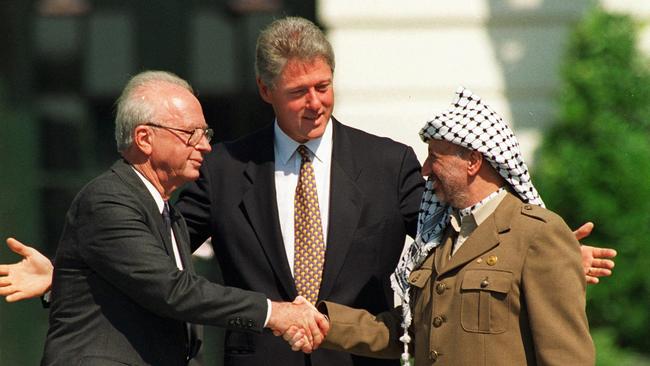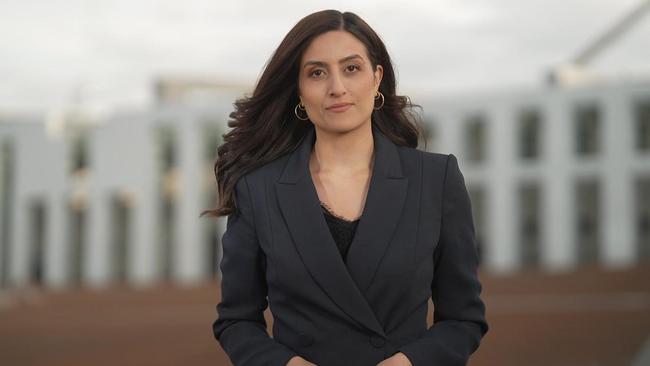Pro-Palestinian journos like Antoinette Lattouf fail to do homework on horrors of Hamas


Israel remains frozen in the massacre’s moment – 100 days ago last week. The country has a steely resolve to make certain no such terror will ever again be unleashed in the Jewish homeland.
Voters who may once have lamented the failure of the Netanyahu government to rein in settler activity or pressure Palestinian leaders for a two-state solution are now just as ambivalent about a long-term peace deal as Palestinians seem to have been since Yasser Arafat shared the 1994 Nobel Peace Prize with Israeli prime minister Yitzhak Rabin for the Oslo Accords that proposed a settlement between Jews and Palestinians.
Arafat and his successors could never deliver.
Pro-Palestinian activist journalists here are right to sympathise with the plight of ordinary Gazans but until they understand what October 7 did to Israel’s psyche, they will have no analysis of merit to offer.
As Israeli President Isaac Herzog told the World Economic Forum in Davos last week, “no Israelis in their right mind” are thinking about the peace process now.
Not surprisingly, many Israelis now believe October 7 was only possible because of the 2005 unilateral withdrawal of Israel’s settlements and military from Gaza.
Israel defeated its Arab neighbours after they invaded in 1948, 1967 and 1973. The areas Palestinians control today were either part of Egypt or Jordan until 1967.
Under Israel’s control since the end of the Six Day War, the Israelis gave this land to the Palestinian National Authority to run in 1994 as part of the Oslo Accords. No Arab state ever granted the Palestinians territory.
Against this background, the ABC is embroiled in controversy about two journalists of Middle Eastern background.
This column believes sacked fill-in radio host Antoinette Lattouf and former Canberra bureau political reporter Nour Haydar are good journalists. With Lebanese heritage, both reflect compassion for Gazans.

Lattouf is suing the ABC over her sacking from a week-long radio contract with ABC Sydney, ostensibly for a social media re-post of a Human Rights Watch report on Gazans being starved. If you trace her Twitter feed, Lattouf has been consistent about Gaza and Israel since October 7, as ABC radio bosses must surely have known.
Haydar is leaving the ABC Canberra bureau for The Guardian. She, like Lattouf, says the ABC has not supported culturally diverse staff. Lattouf says the ABC has allowed its coverage to be too pro-Israel. This will be news to ABC consumers bristling at the pro-Palestinian bias of most ABC reports on the war.
Neither Lattouf nor Haydar have criticised Hamas’s October 7 massacre on social media platform X (formerly Twitter). Lattouf did share one post from another departed ABC critic, Tracey Holmes, on October 8 that sought to “contextualise’’ October 7 by linking to Al Jazeera coverage. Haydar also shared a post on October 7 about rockets being fired from and into Gaza.
Both have shared many Al Jazeera posts, even though that network is widely criticised for its coverage and is linked to Hamas via funding from the government in Qatar. Neither journalist linked their social media feeds to recent devastating accounts by The New York Times and The Wall Street Journal of the weaponising of sexual violence against Jewish women on October 7. Yet both are advocates for female victims of violence.
Lattouf also published video on her social media, and a piece in Crikey, disputing the words said by chanting protesters at the Opera House on October 9. Lattouf concedes “f..k the Jews” was said, and is clearly anti-Semitic. She believes “gas the Jews” may not have been chanted and raises concerns about a video of the march posted by the Australian Jewish Association.
Those watching free-to-air TV news reports of the march that week heard both chants clearly.
What point is Lattouf making? Why defend a clearly racist, anti-Semitic protest only two days after the massacre of 1200 innocents? Lattouf believes the crowd was reacting to the projection of Israel’s flag on to the sails of the Opera House. So government sympathy for murdered women, children and young people at a peace festival was inappropriate?

Pro-Palestinian journalists would do better asking why for 75 years no Palestinian leader has been able to accept peace terms offered several times? Why does the West Bank leadership still pay a cash bounty to Palestinians who commit terror attacks against civilian Israelis? Why are the October 7 murderers being financially rewarded? Anti-Semitism?
Why has no leader been able to sign on to the two-state solution offered by Rabin and offered again with Bill Clinton’s support by Ehud Barak in November 2000?
Why do journalists ignore that Palestinians are still being used as human shields by Hamas?
Why don’t people like Lattouf do their homework about the misleading reporting by groups such as UNRWA (United Nations Relief and Works Agency for Palestine Refugees). ABC Radio National host Sally Sara interviewed Kenneth Roth, former director of Human Rights Watch last Wednesday, and let him claim for 12 minutes and 56 seconds that Gazans are being starved by the IDF.
Why the lack of scrutiny about total death claims? Hamas says 23,000 mainly women and children have been killed. The IDF says it has killed 9000 Hamas fighters plus 1500 inside Israel after October 7.
Israel says Hamas’s numbers include Gazans killed by misfiring of terrorist rockets, civilians shot by Hamas while trying to flee south and up to 1000 “phantom deaths” from the misfired rocket at the Al-Ahli hospital car park.
Why the credulous acceptance of the number of journalist deaths in Gaza? While no journalist deserves to die for bearing witness, do supporters ever wonder why no journalists inside Gaza ever criticise Hamas when lots of Middle Eastern journalists regularly do?
Do journalists understand the origins of anti-Semitic language attributing to Jews the qualities of Nazism and appropriating the language of the Holocaust for Palestinians? This is common in Palestinian poetry and writing. It is used for political purposes in the same way Bolshevik poets used to appropriate biblical language to attribute Christ-like qualities to Soviet leaders.
Finally some questions for the ABC board: is its focus on diversity a mistake? Anyone reading the latest ABC five-year plan will find no metrics for improved journalism, but plenty on social, racial and sexual diversity, Certainly, none on political diversity.
The plan emphasises “digital first” content. Of course its journalism needs to be available on all platforms, but the ABC’s role is not to be just another digital platform. Otherwise why have a national broadcaster?
One media fact here supports traditional news approaches. Print newspapers remain large revenue sources. At Nine, total publishing revenue last year was $575m, $223.5m of it in print.
ABC drama and lifestyle can focus on stories of diversity. The news division needs to break TV and radio news.







Many journalists campaigning for peace in Gaza fail to understand Israel’s public is so traumatised by Hamas’s attacks on innocent civilians in southern Israel on October 7 that there is no internal pressure for peace.